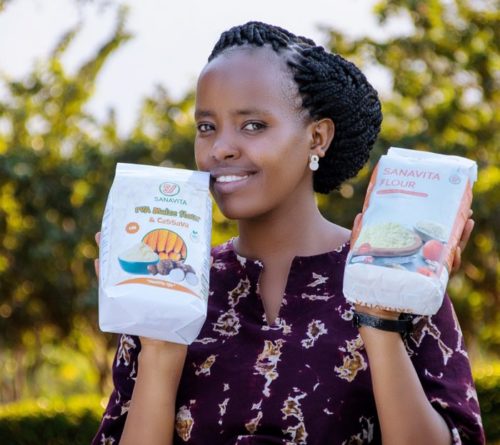Growing beans and mango – and better livelihoods for Tanzanian women and youth
Story

For Jolenta Joseph and Fatuma Mbaga, running their own agribusinesses is about more than just the crops they grow and the foods they produce – although their products are critical in Tanzania. It’s also about creating better lives, for themselves and for the many women and youth they employ and plan to employ in the future.
“My hope for the future is that women and youth can improve their livelihoods through gained knowledge and skills investment,” says Jolenta, 30, whose company Sanavita produces flour and biscuits containing added vitamins and minerals from plants such as sweet potato, maize, and soya beans. The products are much needed in Tanzania, where there are high rates of malnutrition and vitamin A deficiency.
The goal of improving livelihoods – particularly for women and youth – forms the backbone of a new Cuso International-supported project in Tanzania called the Kizimba Business Model. Launched in 2021, the project aims to promote opportunities for self-employment in agriculture and agribusiness for women and youth. To do this, Cuso International works with Sokoine University Graduate Entrepreneurs Cooperative (SUGECO), as well as local government, academic, and private sector partners to provide women and youth with specially created farm blocks to farm crops with strong market demand, including mango and soya beans.
So far, 1,000 hectares have been mapped out for women/youth agribusinesses and in August, nearly 50 hectares of land were cleared and will soon be allocated to participants. The project also provides the women and youth with trainings and workshops specific to business administration, and mentorship and coaching opportunities to help plan and grow their businesses.
“Since becoming involved in this project, we have created jobs for 15 women, and trained and supported more than 1,000 farmers on orange-fleshed sweet potatoes, pro-vitamin A beans, and high iron and zinc beans,” says Jolenta. “Supply of our products in supermarkets, local shops, and schools is also more consistent.”
Romanus Mtunge, Cuso International Country Representative in Tanzania, says the project will help to employ about 5,000-6,400 youth per year. “Our partner (SUGECO) has built an ecosystem where different actors play their specific roles,” he says. “Up to 800 tenants can farm a tract of land, each supported by casual skilled labour.”
Fatuma, 25, is the founder of Get Aroma Spices, a small-sized producer and distributor of natural and dried food spices such as ginger, cardamom, cinnamon, black pepper, lemongrass, and masala. Fatuma’s company buys raw materials from local farmers and then washes, sorts, dries, packs, and distributes spices to wholesalers, retailers, supermarkets, hotels, and other customers.
Through the Kizimba Business Model, Fatuma has received valuable tips and tools for business management, record-keeping, writing business proposals, and developing marketing strategies. “My business has expanded and I’m now able to supply five regions around the country and I’ve attended more than 40 exhibitions,” says Fatuma. She now has her sights set on expanding her business across all of Tanzania, one day operating her own production facility, and providing employment opportunities to other women.
Revocatus Kimario, SUGECO’s Executive Director, is thrilled with the project’s success to date, and says it is making an important contribution to closing the country’s gender gap. “The support has been a catalyst of change in many areas for Tanzania, touching the lives of underserved populations.”
Supporting women and youth to build their agribusinesses and create future employment opportunities makes a tangible difference in the lives of thousands in Tanzania. Thanks to the generous support of our donors, Cuso International can continue projects like the Kizimba Business Model and help others to start their own agribusinesses. You can help more women like Jolenta and Fatuma by donating today.